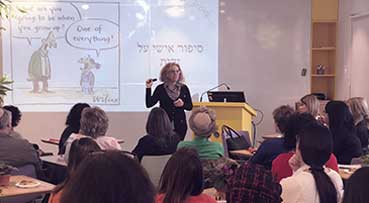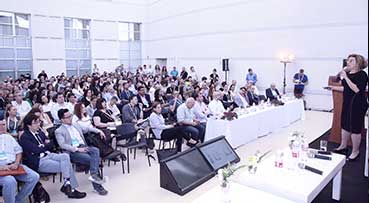The Israeli experience of reservists returning to the workplace offers a compelling microcosm of a broader, global trend in work-life dynamics. In recent months, Israel’s unique workplace landscape has been shaped by employees who are also military reservists, their absence due to military commitments and subsequent return marking a profound transformation in organizational culture. This is not merely a shift from military to civilian life; it encapsulates a deeper exploration into the evolving nature of work. As these individuals reintegrate, they carry with them not just their experiences but also transformative perspectives that challenge and enrich discussions on organizational purpose, team dynamics, and the pursuit of meaningful work. This narrative, while distinct to Israel, echoes a universal theme that resonates across various global work cultures, providing valuable insights into the interplay of personal experiences and professional environments.
The emotional journey these reservists are embarking upon as they reintegrate into civilian life exemplifies the extreme in the ongoing debate about work-life balance This situation, while particularly pronounced in Israel, echoes a growing global trend that has been reshaping our social contract with employment for years. In the past, work and life were distinct realms, with the latter often squeezed into whatever time remained. The COVID-19 pandemic served as a critical turning point, disrupting this delicate balance. In this new era, life has emerged as the victor, a trend that predates the reservists’ return from conflict.
Consider the story of Olympic gymnast Simone Biles, a poignant example of this cultural shift. Her decision to prioritize mental health over competing in the 2021 Olympics transcended the sports arena, spotlighting the growing emphasis on personal health and wellbeing over conventional success metrics. Biles’ choice is emblematic of a broader transformation in workplace priorities. This macro-level change is evident in phenomena like the Great Resignation, which also began in 2021. This movement saw millions stepping back from traditional jobs, driven by the epiphany that life is too fleeting to settle for unfulfilling work. As people returned to the workforce, albeit in different capacities, it became clear that the movement was less about quitting jobs per se, and more about a collective quest for meaningful, satisfying employment that resonates with individual values and lifestyles.
The struggle for work-life balance is an ongoing one, with the rising trend of flexible work arrangements bolstering this shift. Employees around the world have been showing a marked preference for flexibility and autonomy for years, favoring employers and job structures that support this. They’re seeking more than just the ability to work from home; they desire a work model that integrates seamlessly into their lives, rather than dictating them. The growing number of people managing independent careers or juggling multiple jobs is further testament to the increasing desire for control over one’s professional path as part of a larger life plan. Many studies confirm that a significant motivation behind choosing flexible work options is the desire to align jobs with personal skills and interests. This understanding acknowledges that diverse professional experiences, multiple job roles, and varied income sources act as an economic safety net in a rapidly changing world.
These trends collectively signify a profound transformation in the work-life paradigm. The future of work isn’t just about earning a living; it’s about empowering workers to craft lives enriched by their jobs, not constrained by them. As both organizations and individuals explore this new landscape, the emphasis is shifting towards creating work environments and structures that respect and augment personal life, rather than challenge it. The bottom line is, in any tug-of-war between work and life, life will invariably prevail. Thus, it’s incumbent upon organizations to learn how to avoid instigating such conflicts.
Those who believe we can revert to old ways need only consider the failure of U.S. organizations’ attempts to bring workers back to offices as much as they’d like them to be there. In Israel, this now serves as a crucial lesson for those expecting the return of reservists to reset organizations to their pre-pandemic states. The realization that 2024 for us is shaping up to be a year of working amid conflict will further accelerate changes in the work-life paradigm. Like the COVID-19 era waves of lockdowns and reopenings, in this year of working alongside war, we recognize that reservists may be called back to duty intermittently. A year represents a significant period for non-routine work. Like the pandemic, the war has starkly reminded us of life’s brevity — the impact felt by the injured, evacuees, reservists, their spouses, and all those within organizations who have mourned losses recently. War starkly reiterates that life is at the core of everything. Working in the shadow of war presents an extreme version of the challenge to balance work and life in new ways. Hence, there’s no reverting to “business as usual.”
Therefore, the solutions required are also outside of “business as usual,” reflecting insights from the future world of work. Globally, workers are increasingly valuing life, home, leisure, and humanity more than ever before. This goes beyond the traditional ‘work-life balance’ conversation, which initially focused on women and later expanded to all employees. The dialogue has evolved, now centering on work-life integration as a key principle in organizational processes worldwide. This evolution calls for a structured policy approach, one that acknowledges the inevitable challenges life presents, both individually and collectively. In Israel, our current challenges include addressing the needs of evacuees and the spouses of reservists who struggle to maintain their usual work routines, alongside issues of stress, burden, and mental health. However, our story, while unique, is just one example of the myriad challenges faced globally. Every region has its own set of circumstances that disrupt regular work routines and lead to similar stress and mental health concerns. Organizations across the world must proactively establish policies to address and minimize these varied and complex issues.
The need for a comprehensive strategy to manage work-life challenges in for the future of work is clear.
Identify and Anticipate Work-Life Challenges: Recognizing the ongoing tensions between work and life calls for proactive identification of different groups within the organization and the anticipation of their unique challenges. These challenges encompass any factors that could impact employees and their family members, affecting both their personal and professional lives. It’s essential to address these issues non-judgmentally and recognize their importance. In any work-life conflict, life tends to dominate, making it critical for policies to pinpoint areas of tension and implement strategies to mitigate them.
Develop Proactive and Long-Term Solutions: Crafting responses that are both immediate and foresighted is crucial, especially in complex situations like work@war. A pertinent example is how organizations managed the challenges faced by employees who were also reservists’ spouses and couldn’t maintain their usual work routines. Some organizations offered flexibility in work arrangements, while others chose to force them on unpaid leave. While these responses addressed immediate needs, the broader impact of such solutions on overall employee morale, workplace culture, and the company’s employer brand may not have been thoroughly assessed. This situation underscores the importance of proactive and visionary thinking. It highlights the necessity for organizations to develop solutions that not only cater to immediate requirements but also take into account the long-term implications on the workforce and the organization as a whole.
Prioritize Holistic Well-being of Employees and Families: Addressing the physical and mental health of both employees and their family members is a complex yet essential aspect of the modern work environment, which increasingly values flexible work arrangements. Solutions should not only focus on the employee’s well-being but also extend to their families. Adapting to provide comprehensive solutions involves offering flexibility in time, location, and workload, along with benefits and conditions that support life’s various challenges. Managing workloads and fostering opportunities for growth and development are equally important. An anecdote from social media, where a reservist expressed a preference for a Shabbat meal over flowers, underscores that effective support can sometimes be as simple as a thoughtful gesture from a perceptive manager.
Empower Managers with Tools and Authority: It’s imperative to equip managers with the tools, resources, and authority necessary to address a wide array of challenges and the increasing demand for personalized solutions. Managers should be empowered to identify issues, communicate effectively, and refer to appropriate resources. They often face constraints in acting in the best interest of each employee due to limited authority. Addressing this involves delegating more responsibility to managers, thereby enhancing their capability to provide flexible, tailored solutions. It’s also crucial to reinforce that effective work management starts with understanding and addressing the needs of people, ensuring they have what they need to succeed in their roles.
Foster Continuous Learning and Policy Evolution: In this new landscape, continuous learning, updating, and improvement of all work-life policy aspects are essential. Maintaining open and transparent communication channels with both managers and employees is crucial. Actively seeking feedback and suggestions plays a pivotal role in understanding how the organization can better support its workforce. People typically have practical expectations and tend to avoid asking for what is beyond the organization’s capacity. Creating an environment of psychological safety that promotes sharing and collaboration is key. This approach not only helps in identifying effective strategies but also in uncovering simple, cost-effective solutions that yield significant benefits.
The challenges and experiences faced by Israeli reservists returning to the workplace extend beyond the borders of Israel, offering insights into the global transformation of work-life paradigms. These individuals, having navigated the extremes of conflict and “normal work-life”, embody a profound shift in the global workforce: the prioritization of life and personal values over traditional work norms. This evolution is not unique to Israel; it reflects a worldwide movement towards more meaningful, flexible, and life-integrated work models, as seen in phenomena like the Great Resignation. Organizations worldwide can learn from the experiences of these reservists. By adopting policies that respect and integrate personal life experiences, companies can create environments where work and life are not in conflict but are harmoniously interwoven. The future of work, as highlighted by these global trends, is not just about economic survival; it’s about building a life that is enriched by work, not limited by it. By embracing these principles, organizations can foster a culture where work-life balance is not just an ideal but a practical reality, leading to more resilient, satisfied, and productive workforces.

![large-AX1A2125-2[1]](https://niritcohen.com/wp-content/uploads/elementor/thumbs/large-AX1A2125-21-pnzedcs72atx5aeurqytqdiihxixlq02re9mlz805s.jpg)






